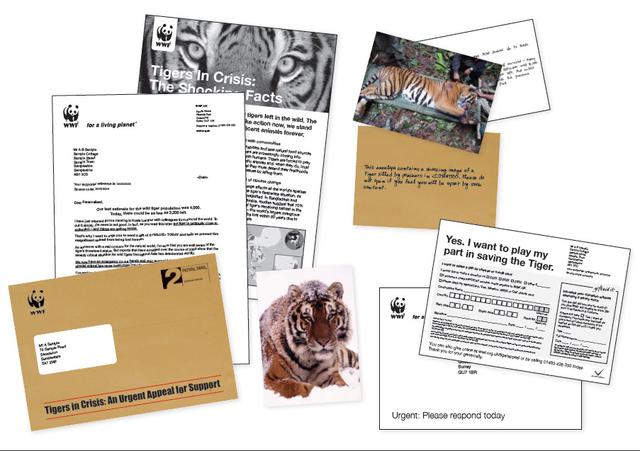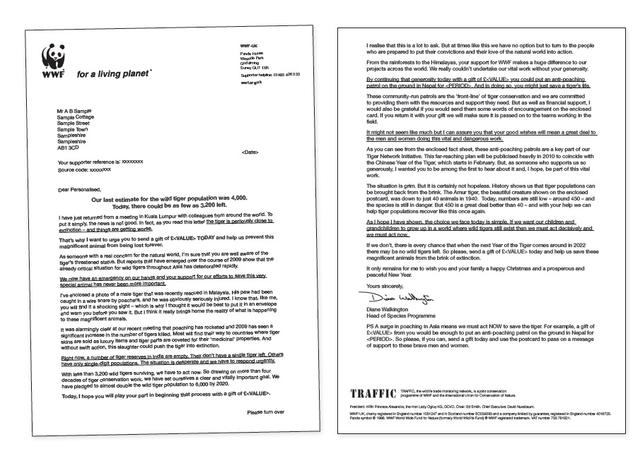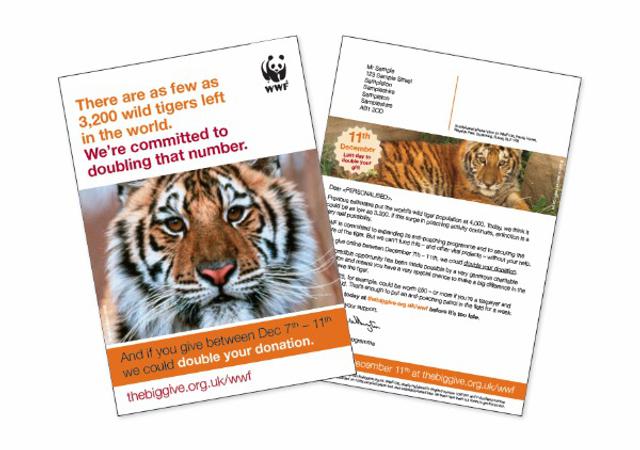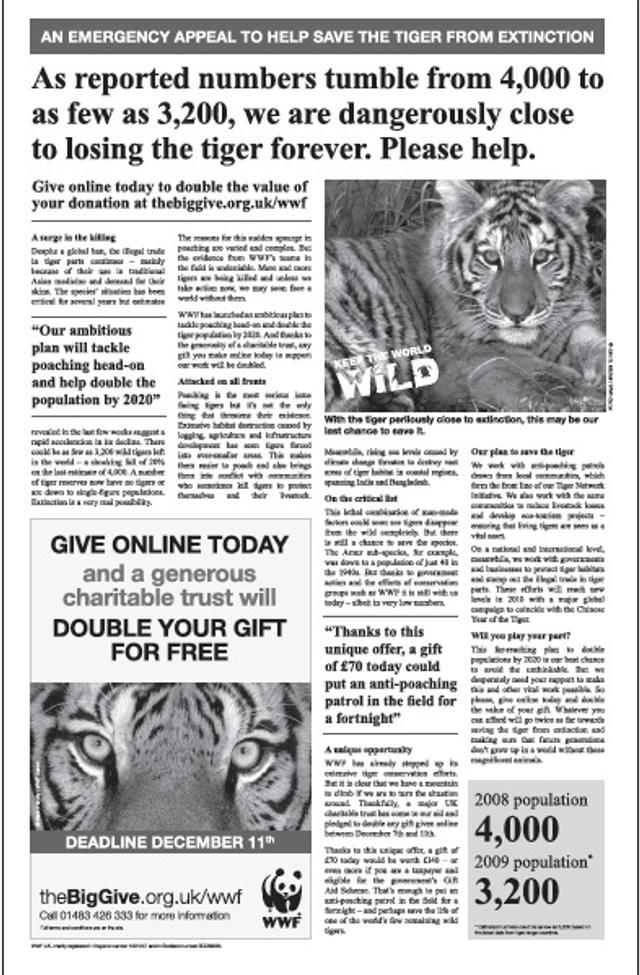WWF UK: ‘Year of the Tiger’ Christmas appeal 2009
- Exhibited by
- Tim Longfoot
- Added
- May 16, 2014
- Medium of Communication
- Direct mail
- Target Audience
- Individuals
- Type of Charity
- Animals, environmental
- Country of Origin
- UK
- Date of first appearance
- December 2009
SOFII’s view
This campaign was wildly successful. It is an excellent example of how one appeal, with an urgent and compelling message, can be tailored to fit different types of donor. It is also integrated fundraising at its best.
Creator / originator
World Wildlife Fund (WWF) and Open Fundraising
Name of exhibitor
Tim Longfoot, Open Fundraising
Summary / objectives
WWF is on the frontline of protecting tigers in the wild. When they discovered that the number of wild tigers had dropped to just 3,200, they launched an integrated Christmas campaign designed to appeal to both warm and cold donors.
By highlighting the danger of extinction – and their plans to prevent it, they aimed to raise £150,000.
Background
To maximise the impact of such a dramatic fall in tiger numbers WWF and Open Fundraising launched a fully integrated emergency appeal to core, mid-value and regular donors. In addition, full-page adverts were run across the national press and WWF’s online networks were activated.
Coincidentally, the forthcoming Chinese New Year marked the start of the year of the tiger.
Special characteristics
The packs avoided a glossy, mass-produced style and deliberately went for a highly personal ‘inside track’ approach. The outers were manila (and stamped in the case of the mid value pack). The usual ‘leaflet’ was replaced with a photocopied factsheet – demonstrating how WWF can reverse the decline in tiger numbers. The donation forms were deliberately basic looking.
The impression WWF were aiming for was a communication prepared in haste and in response to a desperate situation.
Visual impact was provided by two images of a snared tiger, which were enclosed in another manila envelope – this one bearing a handwritten warning about their contents. The idea was to prepare donors for a shock and ensure that they looked at images that not only dramatised the need but also connected them directly to WWF field staff.
Engagement with the project was facilitated via a postcard – which WWF encouraged donors to use to send a message to rangers working to protect tigers in the field.
Much of the pack’s creativity, however, was within the copy where multiple personalisation variables made for letters that really felt like they had been written with the individual alone in mind. Donors to a previous leopard appeal, for example, were reminded of the value of their gift and received a specific update on the project they helped to fund.
The pack was presented in two formats – a simple C5 version for the bulk of the file and a more personalised A4 version for mid value donors.
The reminder mailings were very different in their approach. The proposition was linked directly to The Big Give – where up to £100,000 match funding was on offer for any gift given online.
Given the simplicity of the proposition – give online and double your money – WWF went for clarity and directness. The mailing pack didn’t even need to be opened in order to respond.
A postcard sent to non-mail regular givers made a similar direct appeal. Sometimes, an offer is so good you don’t need to dress it up.
The national press campaign featured a series of long-copy adverts. Editorial in style, urgent and peer-to-peer.
Influence/impact
This campaign was incredibly successful. Each aspect of the appeal achieved an overwhelming response and WWF raised far more than their initial target income.
The huge up swell of emotional engagement that was evident in the messages received from donors has convinced WWF to offer donors the chance to give more than money at every suitable opportunity. The success of personalisation, meanwhile, meant that increasingly data-led creative will be the rule for future appeals.
This appeal was adapted for WWF Canada beating their own tiger appeal by 100 per cent.
Results
The campaign target was £150,000 and raised well over £500,000. Throughout 2010, the year of the tiger, WWF have continued to fundraise to help the tigers, achieving record-breaking results across all channels to both warm and cold audiences.
Merits
The success of this campaign really speaks for itself. However, this exhibit also demonstrates the effectiveness of a fully integrated campaign and how much can be achieved when different donors and their different preferences are taken into account.
 View original image
View original image
 View original image
View original image
 View original image
View original image
 View original image
View original image
Also in Categories
Tags
- DM

















